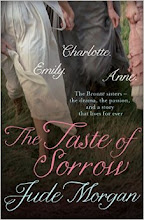I didn't expect to like this as much as I did. I think it may be that the cover put me off, although in light of the content, I'm happy to reappraise the jacket in terms of the careful 1940s colours, the green and cream and muted red. I'm still not keen on the image itself though; there's something rather uninspired about it, which gives the lie to what's inside.
Resistance is a slow book, a simmering book. It is described by Jan Morris, in a quotation on the cover, as a "thriller", but I wouldn't class it as such at all. It is almost a pastoral, owing something to Hardy in its evocation of place, of farmland and of farming ways specifically. It is a book which allows the reader a measure of intelligence; Sheers does not spell events out, but allows conclusions to be drawn in our own time, coaxing us gently in the right direction where needs be, but never patronising. The story starts with the womenfolk of a tiny sheep farming community waking one morning to find their men gone. Twice, it is alluded to that all the women slept late that morning, that none of them can remember much about the night before. Clearly, they were drugged by their husbands, but this is never stated; we are trusted, as readers, to be able to figure it out for ourselves, and there is something deeply satisfying about that.
The Olchon Valley is the real star of the book, lovingly brought to life across the seasons. It overshadows the characters, as it perhaps is supposed to do. But that is not to say that the characters are not drawn with utter conviction, for they are. Sarah is earthy, clever, quick, determined, and yet drowning; in work, in loss, in loneliness. Albrecht is sharp, jaded, chilling. My reaction to him is complex - he is a good guy, sensitive, artistic, battle-scarred. And yet he is threatening, callous - the way he deals with an escaped insurgent is cruel beyond measure, and yet is done with a weariness, an inevitability that is so detached that it is hard to say whether I found him sympathetic in the end or not.
They say poets are sensitive souls - perhaps that is why Sheers writes so well about women, and why the book, though about war (it is set in a 1945 in which German troops invade and occupy Britain) is essentially about two people finding each other in the remote Welsh countryside. It is a fragile, lilting story, like the Welsh accent. There are lines of pure poetry; one character has a wound "in the shape of a melting star". When another speaks,
"[e]verything he said seemed carved from the air. Precise and exact." The best words in the best order, as Coleridge said.
I was perhaps slightly disappointed with the ending, not because it didn't work, or seem fitting, but because the air of menace that rises like volcanic ash and hangs over the novel never really catches fire - the simmer never reaches more than a rolling boil, and the lack of release offered is a little anticlimactic.
Having said that, I really loved this book. It is smart, deep, layered, wild. It wraps itself around you like the valley around Sarah's cottage, simultaneously protective and menacing. It is a book for whom I made bedtime come early, and there is little praise comes higher than that.
Monday, 19 April 2010
Subscribe to:
Post Comments (Atom)


No comments:
Post a Comment